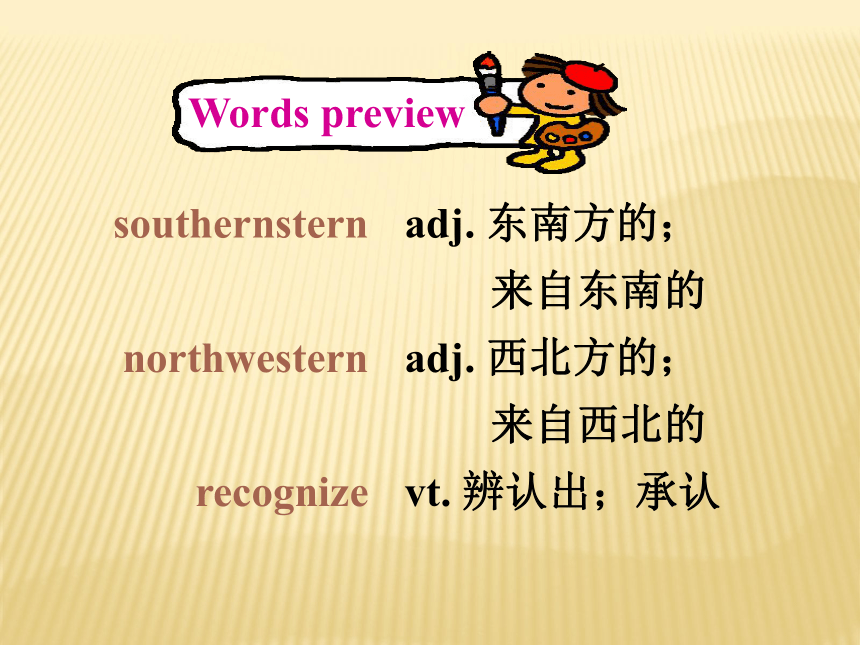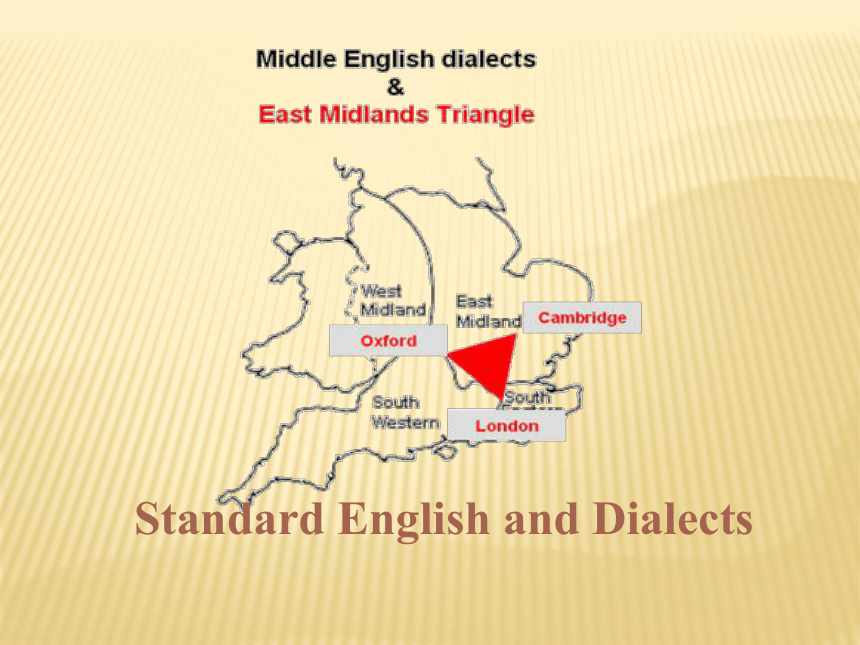Unit 2 English around the world Using language 课件(39张PPT)
文档属性
| 名称 | Unit 2 English around the world Using language 课件(39张PPT) |  | |
| 格式 | zip | ||
| 文件大小 | 2.4MB | ||
| 资源类型 | 教案 | ||
| 版本资源 | 人教版(新课程标准) | ||
| 科目 | 英语 | ||
| 更新时间 | 2019-12-15 09:07:28 | ||
图片预览












文档简介
(共39张PPT)
Unit 2
expression
midwestern
African
Spanish
eastern
n. 语言;表达;表示
adj. 中西部的
adj.非洲的;非洲人的;
非洲语言的
n. 西班牙;西班牙语的
adj. 东方的;东部的
southernstern
northwestern
recognize
adj. 东南方的;
来自东南的
adj. 西北方的;
来自西北的
vt. 辨认出;承认
play a part (in)
扮演一个角色;
参与
Standard English and Dialects
Beijing
Tianjin
Shanghai
Chongqing
Guangzhou
1. China is a very big country where
different dialects are spoken. Can
you list some of them?
2. Is there anybody who can speak a
dialect from other place?
1.What’s the standard English?
It’s believed to be the English spoken on TV and the radio. There is no such a thing actually.
2.What plays a part in making
dialects.
3.Can you tell an interesting or funny story that shows great difference between dialects in Chinese / English?
People from different parts of the world and geography.
I Drop my Weight From Skipping
Mr. Smith was terribly overweight, so his doctor put him on a diet. "I want you to eat regularly for 2 days, then skip a day, and repeat this procedure for 2 weeks. The next time I see you, you'll have lost 5 pounds." When Mr. Smith returned, he had lost nearly 20 pounds.
"Why, that's amazing!" the doctor said, "Did you follow my instructions?" Mr. Smith nodded. "I'll tell you 'though, I thought I was going to drop dead by the end of that 3rd day." "From hunger, you mean?" "No, from skipping! (note: "skip" has two meanings 1) jump 2) stop doing something)
1.What’s standard English?
什么是标准英语?
standard (n.) 标准, 规格 (adj.) 标准的
meet standard 符合标准
standard of living 生活水平
on a standard 根据某一标准
focus
The mountains are not high____
world standard.
A. by B. at C. to D. on
The standard of living of both urban and rural residents is improving.
2. Believe it or not, there’s no such a
thing as standard English.
信不信由你,世界上没有所谓的标准英语。
believe it or not 信不信由你
Believe it or not, all the people present have agreed to the plan.
3. However, even on TV and the radio you will hear differences in the way people speak.
然而, 甚至在电视上或收音机里都会听到人们在说话时的差异。
the way后面接定语从句时, 关系代词用that/in which或不用关系代词。
I did it in the way that/in which you taught me.
I don’t like___ you speak to her.
A. the way
B. the way in that
C. the way which
D. the way of which
4. America English has many dialects, especially the midwestern, southern, African American and Spanish dialects.
美国英语有很多方言, 尤其是在中西部, 南部, 黑人和西班牙方言。
especially 尤其, 表达事物不寻常或特别重要
specially 专门(指专为某一目的)
Our garden is beautiful, especially in autumn.
I came here specially to see you.
5. Geography also plays a part in making
dialects.
地理位置对方言的产生也有影响。
play a (adj.) part
扮演…角色, 起…作用
She play a leading part in the play.
6.Although many America move a lot,
they still recognize each other’s dialects.
虽然许多美国人经常搬家, 但他们
仍然能够辨认彼此的方言。
recognize 辨认,认出(pick out)
recognize sth./sb. as sth./sb.
把…认作…
Drugs were not recognized as a problem then.
T e x a s
Have you ever been to Texas? Now just imagine that you are in this American city and happened hearing an interesting story told in local dialect.Listen carefully and see how much you can understand that.
Lester climbed a tree.
Buford, Billy Bob and Lester went swimming.
Lester thought the catfish would eat him.
Buford and Billy Bob laughed.
Lester saw a catfish.
Now Lester is too afraid to visit the place.
Put the sentences in the right sequence
1.What does Buford think of Texas?
How do you know?
2. How large was the catfish?
He believes it’s quite a different
country from the US. The listening
text tells it is so.
The boys thought that the catfish was almost the size of a house.
3. Why did Lester get out of the water
very quickly?
4.Why did Buford and Big Bob laugh?
He though the catfish would eat him.
They laughed because Lester believed the catfish would hurt him.
Part 1
Hey, y’all, this here is Buford. I come from a big oil town in Texas. Now, y’all need to understand that we ain’t really a state, but a whole’s nother country.Now let me tell ya a story about when I was just a pup. One hot summer’s day I was swimmin with my cousins Little Lester and Big Billy Bob.
Listening text
We was jumpin’in the water and feelin’ good. Then along comes this catfish’bout the size of a house. Well, alright, maybe a little smaller than that. Little Lester starts to thinkin’ it’s goin’ to eat him sure ’nough. Man, you shoulda seen him! He got outta the water fast as lightning and climbed up a tree.
Big Billy Bob and I just laughed and laughed. To this day, Lester won’t go near that place.
Part 2
Hello, everyone, I am Buford’s teacher, Jane, from British. Perhaps you didn’t quite understand everything Buford said. He said that he lived in Houston, a city in Texas.
He wants everyone to know that he doesn’t believe Texas is a state in USA but a different country. Buford says that he would like to tell you a story about him when he was a small child. One hot summer’s day he was swimmin with Big Billy Bob and Lester.
They were jumping into the water, which felt good. Then he says that they saw a catfish almost the size of a house but, he adds, that the catfish was really smaller. Buford says that Lester thought he was going to be eaten by the catfish.
He says, goodness, you should have seen Lester! He says that Lester got out of the water faster than lightning and climbed up a tree. Buford and Big Billy Bob just laughed a lot. To this day, he says, Lester won’t visit that place.
share ideas with others;
decide which are the best ideas;
make a list of those ideas;
put those ideas into a map so that you
can easily see them;
use the map to help you as you write.
Brainstorm
Why we should learn English?
Why should I
learn English?
to use for business.
to use in school.
to write to pen friends.
to talk to
native speakers.
to read
English
books.
to listen to English
music and movies.
Homework :Writing
My Experience of Learning English
Para 1. My problems in learning English.
Para 2. How I can improve my English.
Para 3. What I like about learning English.
Para 4. How I hope to make use of my English.
(Guidance for reference)
Unit 2
expression
midwestern
African
Spanish
eastern
n. 语言;表达;表示
adj. 中西部的
adj.非洲的;非洲人的;
非洲语言的
n. 西班牙;西班牙语的
adj. 东方的;东部的
southernstern
northwestern
recognize
adj. 东南方的;
来自东南的
adj. 西北方的;
来自西北的
vt. 辨认出;承认
play a part (in)
扮演一个角色;
参与
Standard English and Dialects
Beijing
Tianjin
Shanghai
Chongqing
Guangzhou
1. China is a very big country where
different dialects are spoken. Can
you list some of them?
2. Is there anybody who can speak a
dialect from other place?
1.What’s the standard English?
It’s believed to be the English spoken on TV and the radio. There is no such a thing actually.
2.What plays a part in making
dialects.
3.Can you tell an interesting or funny story that shows great difference between dialects in Chinese / English?
People from different parts of the world and geography.
I Drop my Weight From Skipping
Mr. Smith was terribly overweight, so his doctor put him on a diet. "I want you to eat regularly for 2 days, then skip a day, and repeat this procedure for 2 weeks. The next time I see you, you'll have lost 5 pounds." When Mr. Smith returned, he had lost nearly 20 pounds.
"Why, that's amazing!" the doctor said, "Did you follow my instructions?" Mr. Smith nodded. "I'll tell you 'though, I thought I was going to drop dead by the end of that 3rd day." "From hunger, you mean?" "No, from skipping! (note: "skip" has two meanings 1) jump 2) stop doing something)
1.What’s standard English?
什么是标准英语?
standard (n.) 标准, 规格 (adj.) 标准的
meet standard 符合标准
standard of living 生活水平
on a standard 根据某一标准
focus
The mountains are not high____
world standard.
A. by B. at C. to D. on
The standard of living of both urban and rural residents is improving.
2. Believe it or not, there’s no such a
thing as standard English.
信不信由你,世界上没有所谓的标准英语。
believe it or not 信不信由你
Believe it or not, all the people present have agreed to the plan.
3. However, even on TV and the radio you will hear differences in the way people speak.
然而, 甚至在电视上或收音机里都会听到人们在说话时的差异。
the way后面接定语从句时, 关系代词用that/in which或不用关系代词。
I did it in the way that/in which you taught me.
I don’t like___ you speak to her.
A. the way
B. the way in that
C. the way which
D. the way of which
4. America English has many dialects, especially the midwestern, southern, African American and Spanish dialects.
美国英语有很多方言, 尤其是在中西部, 南部, 黑人和西班牙方言。
especially 尤其, 表达事物不寻常或特别重要
specially 专门(指专为某一目的)
Our garden is beautiful, especially in autumn.
I came here specially to see you.
5. Geography also plays a part in making
dialects.
地理位置对方言的产生也有影响。
play a (adj.) part
扮演…角色, 起…作用
She play a leading part in the play.
6.Although many America move a lot,
they still recognize each other’s dialects.
虽然许多美国人经常搬家, 但他们
仍然能够辨认彼此的方言。
recognize 辨认,认出(pick out)
recognize sth./sb. as sth./sb.
把…认作…
Drugs were not recognized as a problem then.
T e x a s
Have you ever been to Texas? Now just imagine that you are in this American city and happened hearing an interesting story told in local dialect.Listen carefully and see how much you can understand that.
Lester climbed a tree.
Buford, Billy Bob and Lester went swimming.
Lester thought the catfish would eat him.
Buford and Billy Bob laughed.
Lester saw a catfish.
Now Lester is too afraid to visit the place.
Put the sentences in the right sequence
1.What does Buford think of Texas?
How do you know?
2. How large was the catfish?
He believes it’s quite a different
country from the US. The listening
text tells it is so.
The boys thought that the catfish was almost the size of a house.
3. Why did Lester get out of the water
very quickly?
4.Why did Buford and Big Bob laugh?
He though the catfish would eat him.
They laughed because Lester believed the catfish would hurt him.
Part 1
Hey, y’all, this here is Buford. I come from a big oil town in Texas. Now, y’all need to understand that we ain’t really a state, but a whole’s nother country.Now let me tell ya a story about when I was just a pup. One hot summer’s day I was swimmin with my cousins Little Lester and Big Billy Bob.
Listening text
We was jumpin’in the water and feelin’ good. Then along comes this catfish’bout the size of a house. Well, alright, maybe a little smaller than that. Little Lester starts to thinkin’ it’s goin’ to eat him sure ’nough. Man, you shoulda seen him! He got outta the water fast as lightning and climbed up a tree.
Big Billy Bob and I just laughed and laughed. To this day, Lester won’t go near that place.
Part 2
Hello, everyone, I am Buford’s teacher, Jane, from British. Perhaps you didn’t quite understand everything Buford said. He said that he lived in Houston, a city in Texas.
He wants everyone to know that he doesn’t believe Texas is a state in USA but a different country. Buford says that he would like to tell you a story about him when he was a small child. One hot summer’s day he was swimmin with Big Billy Bob and Lester.
They were jumping into the water, which felt good. Then he says that they saw a catfish almost the size of a house but, he adds, that the catfish was really smaller. Buford says that Lester thought he was going to be eaten by the catfish.
He says, goodness, you should have seen Lester! He says that Lester got out of the water faster than lightning and climbed up a tree. Buford and Big Billy Bob just laughed a lot. To this day, he says, Lester won’t visit that place.
share ideas with others;
decide which are the best ideas;
make a list of those ideas;
put those ideas into a map so that you
can easily see them;
use the map to help you as you write.
Brainstorm
Why we should learn English?
Why should I
learn English?
to use for business.
to use in school.
to write to pen friends.
to talk to
native speakers.
to read
English
books.
to listen to English
music and movies.
Homework :Writing
My Experience of Learning English
Para 1. My problems in learning English.
Para 2. How I can improve my English.
Para 3. What I like about learning English.
Para 4. How I hope to make use of my English.
(Guidance for reference)
